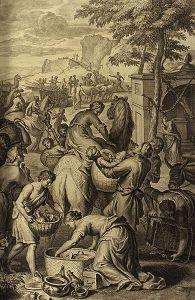
“Then the Lord said to Jacob, “Return to the land of your fathers and to your relatives, and I will be with you.” (Genesis 31:3)
Genesis 29-31 is absolutely riddled with acts of deceit, trickery, and dishonesty. Some of the worst attributes of humanity are on full display: pride, envy, jealousy, greed, and selfishness. But something else is going on behind-the-scenes, almost imperceptibly, in the life of Jacob. While Leah and Rachel start a sort of “arms race” to see which sister can most rapidly populate the town of Haran; and while Uncle Laban seeks to further exploit Jacob, turning him into practically a slave laborer; Jacob is learning about himself and about God.
When we consider the Jacob of before: the Jacob who took advantage of Esau and purchased the rights of the First-born son for a bowl of soup, the Jacob who pretended to be Esau in order to trick his own father into passing the blessing on to him rather than his older brother, we cannot help but notice that something is very different. Something has changed in Jacob. Now, we must realize that God is not done with him yet, he still has a ways to go, but we see Jacob begin to trust in God and His provision rather than in his own strength, abilities, and ingenuity.
“But Laban said to him, “If now it pleases you, stay with me; I have divined that the Lord has blessed me on your account.” (Genesis 30:27)
The fact that God was active in the life of Jacob, that God was blessing Jacob, was indisputable. Even Laban, a pagan, recognized that not only was God’s hand upon Jacob but that His favor spilled over onto Laban’s own enterprises. Laban was “blessed by proxy” for the sake of Jacob. Although most do not ever seem to, some non-believers will recognize that something is different when they have in their employ a genuine child of God. God’s unmistakable blessing will pour over onto their business as the Lord prospers the efforts of His own servant who works for them. What a powerful testimony to the goodness of God before a lost world! Such was the case of Laban who knew that it was not upon his own treacherous heart that God was bestowing His graciousness. This candid confession from the lips of Uncle Laban was an additional confirmation to Jacob that God was with him.
“And said to them, “I see your father’s attitude, that it is not friendly toward me as formerly, but the God of my father has been with me.” (Genesis 31:5)
About the same time that the sons of Laban begin to make accusations that Jacob has defrauded their father, God appears to Jacob, calling him back to his homeland. Jacob’s response was not to confront his accusers, nor to seek to defend himself. Jacob simply called his wives to him and laid out his case for leaving. Jacob knew that Laban was angry at him and that it was within Laban’s power to kill him (see Gen. 31:29), but Jacob also knew that God was with him. He believed that God would protect him and take care of him.
“Thus God has taken away your father’s livestock and given them to me.” (Genesis 31:9)
At first glance, it appears that Jacob’s plan to divide the livestock of Laban (Gen. 30:32-33) might have been yet another attempt by Jacob to get the upper hand and take control of matters himself. But Jacob takes no credit for this whatsoever. He announces to Leah and Rachel that God was the One Who instructed him to do what he did (Gen. 31:9-12). There was really no deception in what Jacob did, nothing dishonorable — though Laban’s sons seemed to think there was! In fact, Laban had agreed to the terms of the contract beforehand (Gen. 30:34). This time Jacob left things to God, and he ended up acting without guile.
After all this, however, we see Jacob flee from Laban much as he had fled from Esau (Gen. 31:20-21). He was trusting God, but maybe he wasn’t quite as faith-filled as he could have been! But Jacob would soon learn that he could no more run from this problem than he could from his brother — soon he would be confronted head-on with both. It seems in Jacob’s case (much as it is in our own) that taking confidence away from the flesh and putting it on God is not something that is resolutely accomplished in one day. It is a process. “He must increase, but I must decrease”, the words of John the Baptist go (John 3:30). And so we, too, must esteem the Lord in our own eyes as we rely more on Him and less on ourselves.
To Jesus Christ goes all glory. In service to Him,
Loren
[This post was originally published June 25, 2010]
[If you do not know the Lord Jesus Christ or you are not certain where you are headed when this life ends, I invite you to read the article “Am I Going To Heaven?“]
**Unless otherwise indicated, all Scripture quotations are taken from the New American Standard Bible (NASB) © The Lockman Foundation and are used by permission.
Advertisements &b; &b;